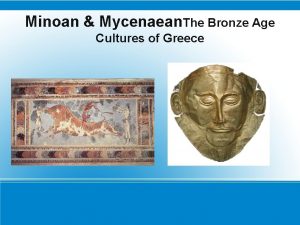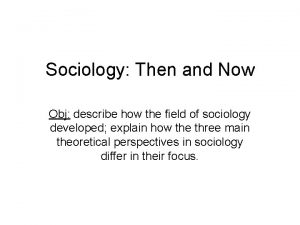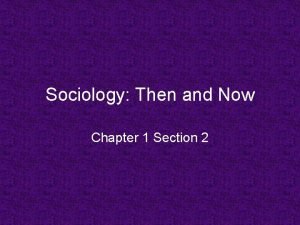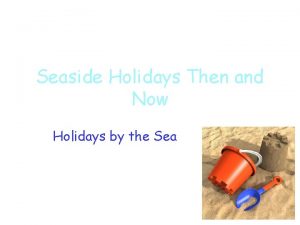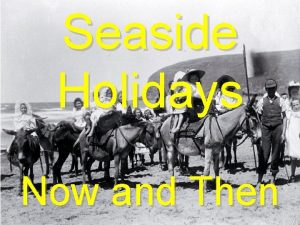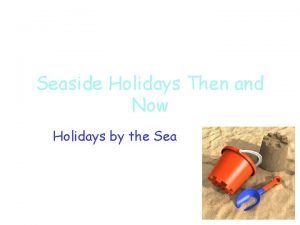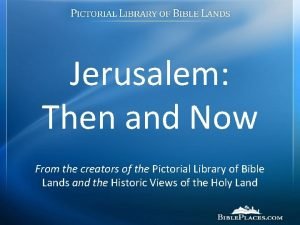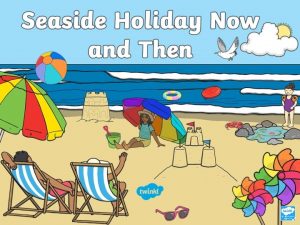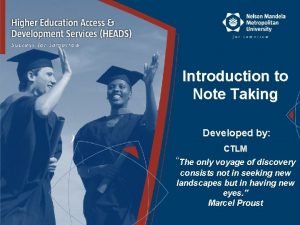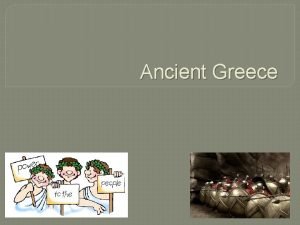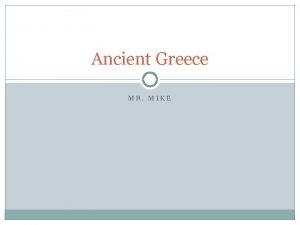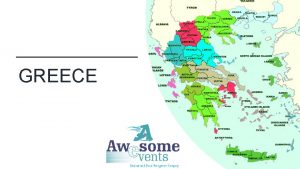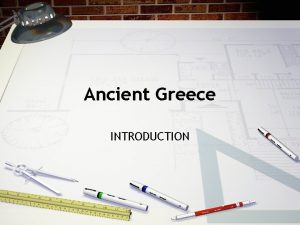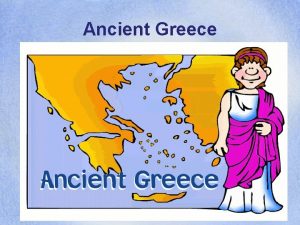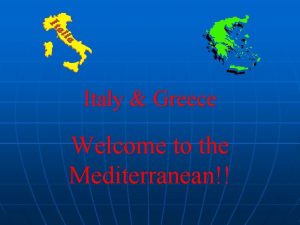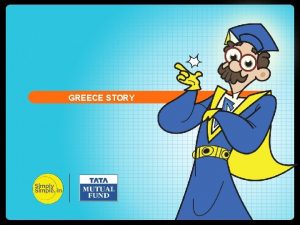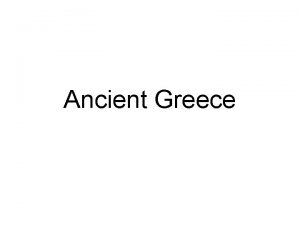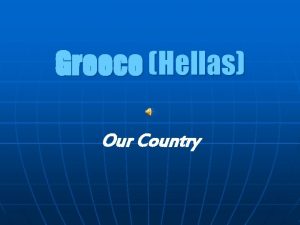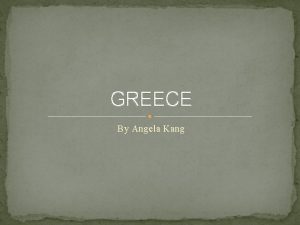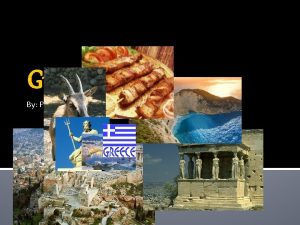The Location of Greece Now and Then Now








































- Slides: 40


The Location of Greece Now and Then Now Then


• Location

• Knossos is the site of the most important and better known palace of Minoan civilization. • Intensive habitation occurred mostly in the Minoan period. • The city flourished again during the Hellenistic period and in 67 B. C. it was captured by the Roman Quintus Caecilius Metelus Creticus. • Knossos was discovered in 1878 by Minos Kalokairinos.

• The Minoan civilization was named after the legendary King Minos, • The Minoan civilization was based on sea-power and on sea-borne trade with contacts. • The Minoans developed powerful navies by which they established relations with Egypt and the east.

• Most of what is known of Minoan clothing comes from depictions on fresco paintings, statuettes, pots, and relief sculpture. • Clothing worn during the Minoan civilization was much more fitted than that of later periods. • Women's skirts had a basic bell-shape. Women also wore apron-like garments that extended to mid-thigh in the front and back over their skirts In colder weather, people wore shawl-like garments or cloaks made out of leather or wool. •

• Minoans were polytheistic (the belief of many gods) and matriarchal (women had a lot of power) • Scholars believe that the principal female goddess of Greek religions ultimately gained from the Minoan goddesses. • The Minoans particularly worshipped trees, pillars (sacred stones), and springs. • The Minoan religious world had numerous demons.

• The use of metal (first copper then bronze) already long familiar in the east became known to the Minoans. • Cretans made rapid and brilliant artistic advancement • Minoans writing in some instances surpassed that of Egypt and Sumeria.

• The Minoans grew wheat, barley, grapes and olives. • The Island of Crete was a main stopping point for any ships traveling past.

• The End of the Minoan culture came quickly. • In 1650 B. C. a volcano erupted. • There is evidence that the Minoans were soon conquered by the Mycenaens who moved out to Crete from the mainland.


• Mycenae is the legendary home of the Atreides. • Mycenae was inhabited since Neolithic times.

• The Mycenaeans entered Greece from the north or northeast 2000 B. C. • By 1600 B. C. , Mycenae had become a major center of the ancient world.

• Paris, who was the prince of Troy went to Sparta to take Helen was married to King Menelaus. • The Greeks gathered a huge army at Aulis under the direction of Menelaus and his brother Agamemnon, who became the Commander in Chief. • The war went on for nine years without much change. • Odysseus thought of a plan to make a hollow horse with soldiers inside.

• Mycenaean civilization came to an end by 1100 B. C. • Perhaps a climatic change made the region less productive and caused people to migrate to other lands in search of food.


• The Dorians originated from northwestern Greece, Macedonia and Epirus. • The Dorians themselves, were in many ways primitive compared to the Bronze Age Myceneans, and there are many hypotheses about their origins. • The Dorian's influence in the Aegean reached Halicarnassus and Cnidus (Turkey). • As the Dorians settled many areas of the Aegean, their way of rulership was generally to merge with the indigenous people of their land, as seen with the invasion of Corinth, Rhodes, and Argos. • Among the many artistic elements used by the Greeks the Doric architectural element of large order and structure.



• • The king of a community was chosen from one of the wealthy landowning families. Citizenship was not open to every city- state resident. It was restricted to men-and, more specifically, to men born of citizen families. • Citizens in Sparta were uniquely and totally devoted to city- state matter and to each other. • Life in Sparta was like a vast military camp, and its citizenry like one huge army. • In contrast to Sparta, Athens was a center of commercial and artistic activity. And unlike the closely knit Spartan citizen class, the Athenian citizen class was sharply divided which caused class contrasts. • Poor citizens had no control over their government. • Cries of the starving poor were answered with insults and abuse by the wealth. • By the close of the sixth century B. C. , the city- states growth process was complete.

Athens • • • • Government Had elected officials including 10 generals and magistrates. Council of 500 was charged with administering decisions made by the Assembly. The Assembly passed laws and made policy decisions. During time of Pericles citizens were paid for jury service so not only the wealthy could participate. Women did not participate in the political life of Athens. The Persian Wars The Persians conquered the Lydians in 546 BC and with the Lydians came a few city-states. The tyrant of Miletus, Aristagoras, began a democratic rebellion. The Athenians helped Miletus to do this. By 495 BC, the Persians, had restored control over the rebellious Greek cities. The Persians desired that Athens be punished for the role it played in the rebellion. This started a battle. Had the Athenians lost, Greece would have eventually come under the control of the Persians. The Persian government wasn’t able to launch a battle against Athens until Xerxes became king, . During this time, the Greek politician, Themistocles, convinced the Athenians that there was reason to still worry. Themistocles developed a strategy that helped the Athenians to defeat the Persians. Although the Spartans fought most of the wars against Persia, Athens was the city-state the country turned to follow.


Comparisons of Sparta and Athens (continued)

• According to legend, the ancient Olympic Games were founded by Heracles the son of Zeus. • The games were played every four years for nearly 1200 years. In 393 CE, • A Roman emperor abolished the Games. • The very first modern Olympic Games opened in the first week of April 1896. • A wealthy Greek architect, Georgios Averoff, donated over $100, 000 to restore the Panatheniac Stadium. • The Games were not well publicized internationally. • Some contestants were tourists who happened to be in the area during the Games. • Pole vaulting, sprints, shot put, weight lifting, swimming, cycling, target shooting, tennis, marathon and gymnastics were all events at the first Olympics.

• The two masks on the screen are the symbols for theater. • They represent the comedy and tragedy masks that were worn in ancient Greece - during the golden age, around 500 - 300 BC. • All the actors were male, and they all played multiple roles, so a mask was used to show the change in character or mood. • • DRAMA Drama comes from Greek words meaning "to do" or "to act. " • A play is a story acted out. It shows people going through some eventful period in their lives, seriously or humorously. • Ancient Greece was the birthplace of the drama of the Western World.

• • • • • Aristotle Born in Stagira in north Greece. The son of Nichomachus and the court physician to the Macedonian royal family. Went to Macedonia in 338 B. C. to tutor Alexander the Great. Homer was a blind poet. Smyrna was the city of his birth. Plato Born in Athens. Coming from a noble family, he aspired to a political career, but soon became upset with the "tyrannic democracy" of Athens, Plato "turned to philosophy in search of an alternative to the stable and unjust public life of the time. Socrates The son of the statuary Sophroniscus and of the midwife Phaenarete. He was born at Athens, not earlier than 471 B. C. and no later than May or June 469 B. C. He began life as a sculptor. Abandoned art and gave himself to education, Pythagoras Often described as the first real mathematician. The Pythagorean Theorem was named after Pythagoras.


• Aeolian Harp • Anchor-592 B. C. • Burnt brick used in 3555 B. C. but was unreliable • Chewing gum (made from bark of masta tree) • Coin automat (penny-in-slot machine) • Catapult


• • Importance/Role Philip II of Macedonia ruled from 359 -336 B. C. E. When Philip began ruling Macedonia was in political and military turmoil. Eventually Philip sought to bring all of Upper Macedonia under his control. His primary method was through marriage. Athens and Thebes were forced to become subjects of Philip and Macedonia, leaving Sparta as the only Greek state not under Macedonian control. With the support of all Greece, Philip declared war on Persia to get even for the Persian invasion of Greece several generations before. Just before Philip himself was to travel to Asia to begin the conquest, he was assassinated. Assassination of Philip was killed by a bodyguard named Pausanias who was jealous of another bodyguard named Pausanias as well. Apparently the second Pausanias was more loved by the king.

• Empire • Alexander wanted a kingdom involved in trouble and war and he hated a life of a comfortable sloth. • Death • • Suddenly, In Babylon Alexander was taken sick because he drank too much unmixed wine. He died on June the 10 th and left his palace to the strongest and best warrior.

• Alexandria is the second largest city and the main port of Egypt. • The city was named after Alexander the Great and remains of the city are still available today. • The arch was a major development for the Greek architecture due to the fact that it could hold much more weight than pillars.

• Rome began taking an interest in Greece but Philip V of Macedonia wouldn’t allow it and defeated them in war in 206 B. C. • Later, the Romans invaded Greece in 146 B. C. and made Greece a Roman city.


• The amazing statue of Zeus built around 450 BC. • The Roman emperor tried to transport the statue to Rome but failed because its scaffolding collapsed. • Today nothing remains of the statue.

• The Lighthouse of Alexandria was not only the tallest building in the world at the time it also helped sailors see land when they were at sea. • The Lighthouse was the last world wonder to disappear.


• In 490 BC, Pheidippides, a Greek soldier, ran a marathon to Athens (about 25 miles) to tell the Athenians the result of the battle with attacking the Persians. Afterwards he was so tired and sick that he died. • The Pythagorean Theorem was not named after Pythagoras because he invented it but because he proved it. • Roughly 60% of all English words and 90% of technical and scientific terms are from ancient Greek and Latin words. • In 2005 a movie was made about Alexander the Great’s life.

 Greece then and now
Greece then and now Mycenae greece location
Mycenae greece location Sociology then and now
Sociology then and now Sociology then and now
Sociology then and now Seaside holidays now and then
Seaside holidays now and then Seaside holidays in the past
Seaside holidays in the past Benjamin banneker inventions
Benjamin banneker inventions Dubai then and now
Dubai then and now Agriculture now and then
Agriculture now and then Child labor then and now venn diagram
Child labor then and now venn diagram Seaside holidays then and now
Seaside holidays then and now History of physical education
History of physical education Then and now grammar
Then and now grammar Ffa officer stations and symbols
Ffa officer stations and symbols Jerusalem then and now
Jerusalem then and now Victorian seaside holidays
Victorian seaside holidays If then board
If then board Five r's of note taking
Five r's of note taking A cross country skier moves from location a to location b
A cross country skier moves from location a to location b Location planning analysis
Location planning analysis That was then this is now summary
That was then this is now summary The story of an hour summary
The story of an hour summary Reported speech for yesterday
Reported speech for yesterday Then now
Then now Now i see it now you don't
Now i see it now you don't Hát kết hợp bộ gõ cơ thể
Hát kết hợp bộ gõ cơ thể Frameset trong html5
Frameset trong html5 Bổ thể
Bổ thể Tỉ lệ cơ thể trẻ em
Tỉ lệ cơ thể trẻ em Voi kéo gỗ như thế nào
Voi kéo gỗ như thế nào Chụp tư thế worms-breton
Chụp tư thế worms-breton Chúa yêu trần thế alleluia
Chúa yêu trần thế alleluia Kể tên các môn thể thao
Kể tên các môn thể thao Thế nào là hệ số cao nhất
Thế nào là hệ số cao nhất Các châu lục và đại dương trên thế giới
Các châu lục và đại dương trên thế giới Công thức tính độ biến thiên đông lượng
Công thức tính độ biến thiên đông lượng Trời xanh đây là của chúng ta thể thơ
Trời xanh đây là của chúng ta thể thơ Mật thư tọa độ 5x5
Mật thư tọa độ 5x5 101012 bằng
101012 bằng Phản ứng thế ankan
Phản ứng thế ankan Các châu lục và đại dương trên thế giới
Các châu lục và đại dương trên thế giới

